With Bannon exiled by Trump, what happens to the candidates he backed?

After leaving the White House last year to return to his job as Breitbart News chief, Steve Bannon announced that he was launching a new kind of campaign.
Hoping to channel the right-wing, anti-establishment fervor that had propelled Donald Trump to the presidency, the former White House chief strategist would now travel the country recruiting insurgent GOP candidates to challenge incumbent Republican senators running for reelection in 2018 — almost all of them.
He promised to overturn the “globalist clique on Capitol Hill” with its “total contempt for the forgotten man and the base.” Bannon’s acolytes would be chosen for their loyalty to the “basic agenda that Trump ran on and won,” and their promise to vote against Mitch McConnell, the personification of the GOP establishment, for another term as Senate Majority Leader.
Within a few months he had given his blessing to at least seven candidates in mostly Western and Southern states.
But then came December’s special election in Alabama, in which Bannon went all in for accused child molester Roy Moore, who became the first Alabama Republican to lose a statewide race to a Democrat since 1992. That humiliation was followed last week by the publication of Michael Wolff’s Fire and Fury, in which Bannon was quoted disparaging Trump and his family at length.
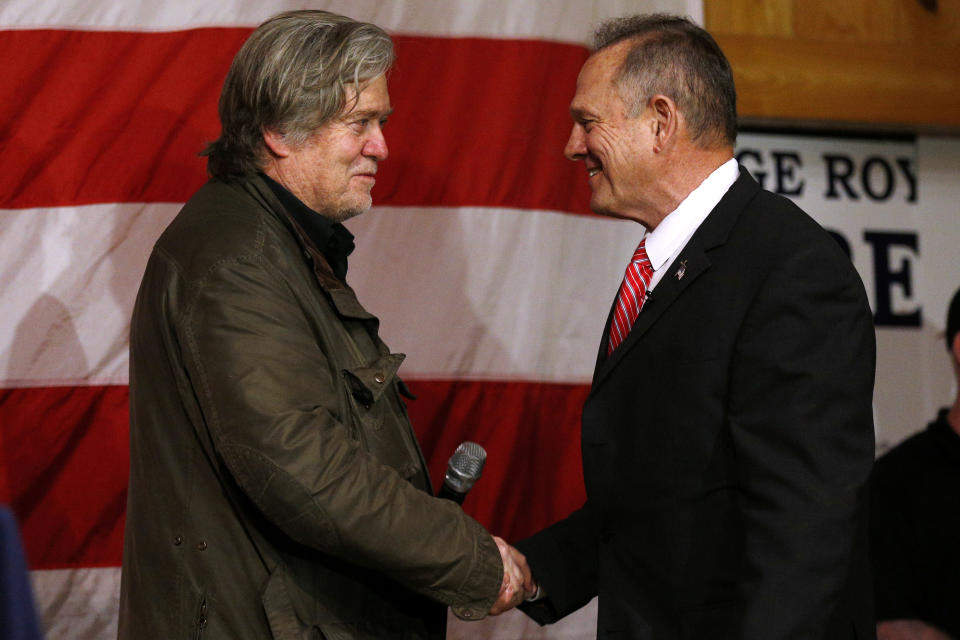
Trump promptly threw his former confidant under the golf cart. “Steve Bannon has nothing to do with me or my presidency,” he proclaimed. “When he was fired, he not only lost his job, he lost his mind.”
Within hours, Bannon’s billionaire patrons Robert Mercer and his daughter Rebekah said they were withdrawing their support and word began to spread that even Bannon’s job at Breitbart was in doubt. Reports soon surfaced that Bannon’s fledgling political group, Citizens of the American Republic, had so far failed to build any infrastructure or secure any real funding, suggesting that Bannon was less influential than he liked to pretend.
Meanwhile, on Sunday, Trump insisted that he was done stumping for GOP outsiders like Moore.
“I don’t see that happening,” the president said, adding that he did plan to campaign for incumbents.
By Tuesday, Bannon had parted ways with Breitbart News, further diminishing the volume of his political megaphone and stripping away what influence he wielded for the candidates he had handpicked.
But the truth may be a little more complicated — and interesting. All of the declared candidates that Bannon considered part of his “coalition” were already running before he endorsed them — and all of them will continue campaigning without him.
So while Bannon may be an outcast, his candidates could continue to shape the 2018 Republican season in strange and surprising ways.
Here’s a closer look at each of them:
_____
Kelli Ward
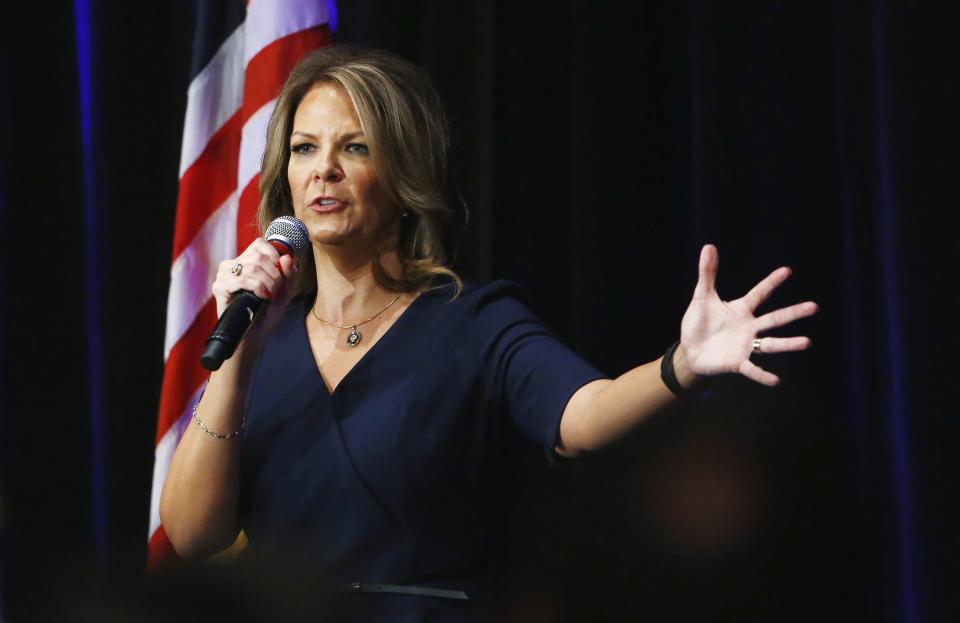
No candidate welcomed Bannon’s endorsement as enthusiastically as Arizona Republican Kelli Ward, a 48-year-old osteopath and former state senator from Lake Havasu City.
During her campaign kickoff event in October, a beaming Ward watched from the wings as Bannon riled up the crowd with talk of an “open revolt” against Republican elites who “think you’re a group of morons.”
They will “reap the whirlwind,” Bannon vowed. “And that whirlwind is Kelli Ward.”
But since Bannon’s break with Trump, Ward’s team has been distancing her from the embattled Breitbart chief.
“Steve Bannon is only one of many high-profile endorsements Dr. Ward has received,” campaign spokesman Zachery Henry said last week.
Ward’s campaign strategy is simple: Do as Donald Trump would do. Since launching her bid in late 2016, Ward has unapologetically championed all of Trump’s most controversial proposals, from the Muslim ban to the border wall; when the president visited Phoenix in August, Ward’s team walked the streets in bright yellow T-shirts that read TRUMP 2016 WARD 2018 on the front and #MAKEARIZONAGREATAGAIN on the back.
“People are sick and tired of the elected official who goes to Washington, D.C., and is not a representative of the people,” Ward told Yahoo News. “They’re tired of the disingenuousness. They’re tired of Paul Ryan and Mitch McConnell and John McCain and Jeff Flake.”
Embracing the president’s top campaign strategist was perfectly in keeping with Ward’s all-Trump-all-the-time approach.
But now look for Ward to pretend Bannon never existed — and to hug Trump even tighter.
The question that could define her campaign — and determine her fate — is whether Trump hugs her back.
The president has been sympathetic before. When Ward entered the race, she was mounting a primary challenge against Flake, Arizona’s junior senator and one of the GOP’s most vocal Trump critics. At the time, Trump tweeted that it was “great to see” Ward “running against Flake Jeff Flake.” Mercer sent $300,000 to Ward’s super-PAC, and two former pro-Trump super-PAC leaders signed on to run her campaign.
Meanwhile, the GOP establishment — which views Ward as a loose cannon who could cost the party a precious Senate seat in November — began to fight back. In August, the McConnell-aligned Senate Leadership Fund super-PAC released an ad on the web that painted Ward — and, by implication, the entire Trump movement — as out of touch with reality.
The party’s worries about Ward are numerous: she plagiarized a Mitt Romney ad; she mocked John McCain as old and weak, and after he was diagnosed with brain cancer, called on him to retire so she could take over his seat; in 2015, she earned the nickname “Chemtrail Kelli” after hosting a town hall meeting to discuss a conspiracy theory — a theory she says she doesn’t believe — that the trails of white condensation emanating from airplane engines are actually dangerous chemicals being dispersed by the government. She also ran against McCain in 2016 and wound up losing the GOP primary by more than 11 percentage points.
Yet the more Flake antagonized Trump, the more Republican support he lost back home; by the end of the summer, his approval rating had plummeted to 18 percent, and early polls showed Ward with a double-digit primary lead. In October, Flake announced that he would be retiring from the Senate at the end of his term.
As a result, a race that seemed fairly black and white — anti-Trump incumbent vs. pro-Trump insurgent — suddenly became a lot less clear cut. Washington insiders, including some Trump officials, stepped up their search for an alternative to Ward. Rep. Matt Salmon passed up the race; Arizona Treasurer Jeff DeWit accepted a NASA post instead. Now the party seems to have settled on Rep. Martha McSally — a Harvard-educated former fighter pilot from Tucson — as its likeliest standard-bearer. McSally is more popular than Flake and friendlier to Trump — she has voted with the president nearly 97 percent of the time, which exceeds even the figure of 90.7 percent for Flake — and Arizona politicos say she would stand a much better chance of defeating Rep. Krysten Sinema, the near-certain Democratic nominee.
Which is where Trump comes in. If the president refuses to weigh in on Ward’s behalf — or sides with McConnell and endorses her more electable rival — it will undermine Ward’s whole raison d’être.
Further complicating matters is the fact that former Maricopa County Sheriff Joe Arpaio announced Tuesday that he will also be running in the primary. Arpaio’s harsh anti-immigrant policies have made him a hero to the far right, and as the recipient of Trump’s first presidential pardon, he will be competing for the same America First, pro-Trump voters that Ward hoped to have all to herself.
Ward is still popular with Arizona’s GOP base — she helped drive the hated Flake from office, after all — and she could still cause serious problems for McSally and McConnell in the primary.
But there are already signs that Trump World is souring on her. In October, Ward’s top strategist and press secretary, both ex-Breitbart reporters, abruptly quit the campaign, apologizing to “America First activists and the people of Arizona for helping to legitimize her candidacy.”
“We’ve realized that [our work with Ward] was a mistake,” they wrote in a cryptic statement. “[Arizonans] deserve better candidates.”
Will Trump himself come to the same conclusion?
_____
Danny Tarkanian
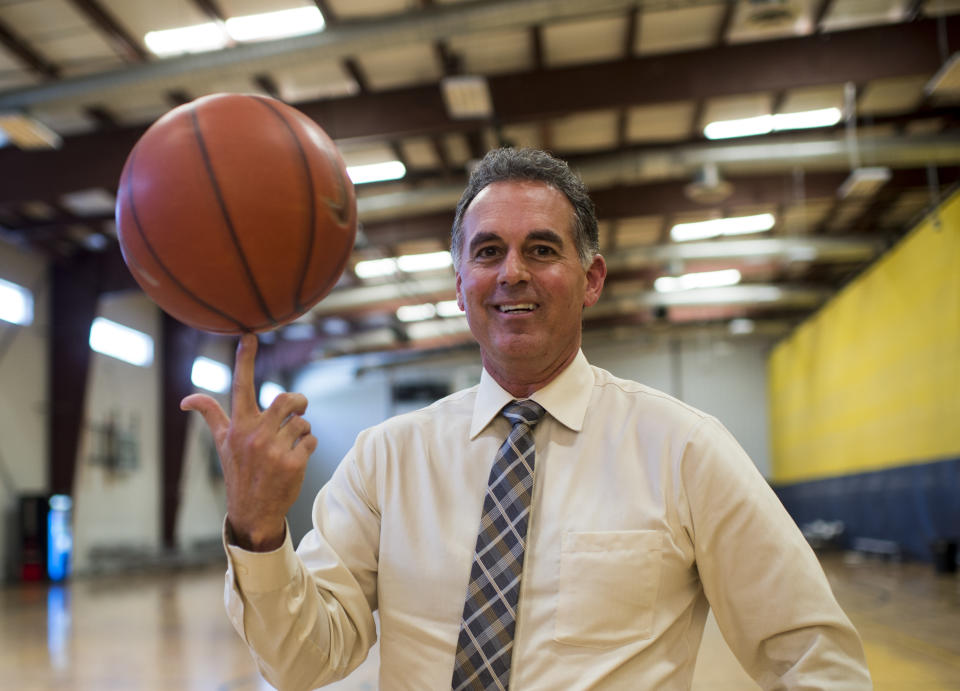
In September, Bannon huddled at Breitbart’s Capitol Hill headquarters with Danny Tarkanian, the son of legendary University of Nevada, Las Vegas basketball coach Jerry Tarkanian and a perennial right-wing Nevada candidate. A month earlier, Tarkanian had announced that he would be challenging incumbent Republican Sen. Dean Heller, who denounced Trump during the 2016 campaign and torpedoed an early version of the GOP’s Obamacare repeal legislation.
“[Bannon] told me he supported me 100 percent,” Tarkanian claimed in a BuzzFeed interview. “He said, ‘It was nice to see a candidate that exceeds my expectations.’ So I took that as a very good compliment.”
With Arizona’s Jeff Flake declining to run for reelection and Nevada trending blue — Hillary Clinton defeated Donald Trump there in 2016 — Heller is by far the most vulnerable Republican senator in the country. So far, he also is the only GOP incumbent fending off credible challengers from both the right and the left — which means the stakes of Bannon’s anti-establishment antics may be higher in Nevada than anywhere else.
And those stakes are likely to remain just as high regardless of whether Bannon himself is a player in the race.
Tarkanian’s strategy is to assault Heller for being insufficiently pro-Trump — and insufficiently principled, especially when it comes to Obamacare.
“When [Heller] has seen a political advantage in attacking Obamacare, he has done so,” Tarkanian wrote in December. “When the tide seems to be running against repeal, he has opposed it and pushed back against calls for repeal.”
Tarkanian’s pitch could resonate in the primary because has a point: Heller has been all-over-the-place on repeal, and his standing in Nevada has suffered as a result. Tarkanian is also correct when he notes that Heller has waffled on Trump, declaring in 2016 that “I vehemently oppose our nominee” but sounding (conveniently) friendlier since the pro-Trump Tarkanian entered the race.
He has a “much closer relationship” now with the president, Heller told the Las Vegas Review Journal last week.
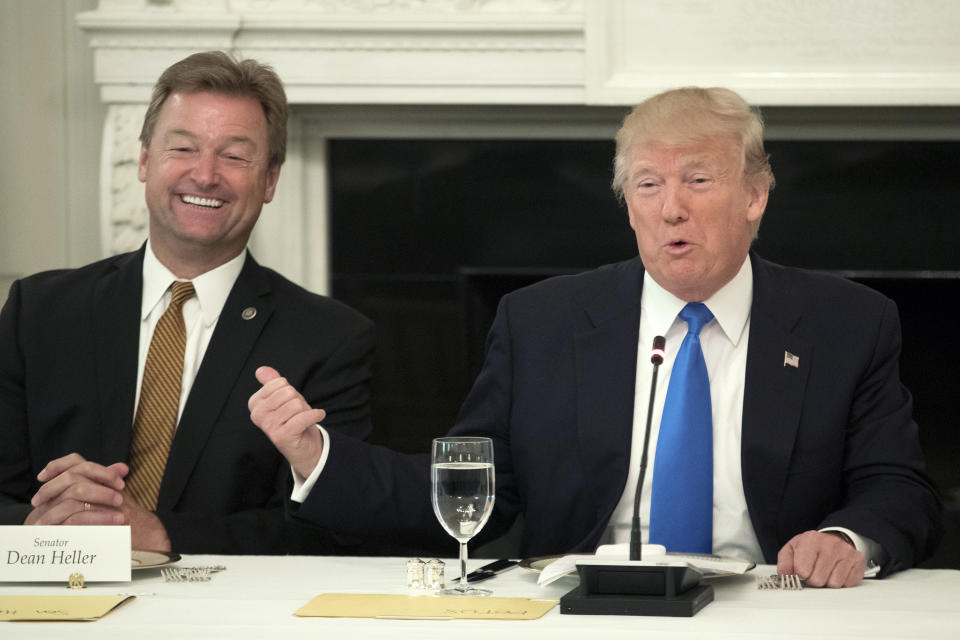
The problem, from McConnell’s perspective, is that however accurate Tarkanian’s attacks may be, his presence in the primary will probably only make it harder for the GOP to retain Heller’s seat. The latest independent polls give Tarkanian the lead; to win, Heller will have to veer further to the right by touting his new chumminess with Trump and his rediscovered distaste for Obamacare. But those are the very things that would weaken Heller against Democratic Rep. Jacky Rosen, a strong campaigner who has been out-fundraising Heller since announcing her bid in July.
If, on the other hand, Tarkanian prevails, he will face a rematch with Rosen — to whom he has already lost once before, in the 2016 battle for Nevada’s Third Congressional District.
And that isn’t the only election Tarkanian has lost. In fact, he has run for office five times — and he has lost all five races. In 2004, Tarkanian ran for state senate. In 2006, he tried for secretary of state. In 2010, he sought the nomination to run against Democratic Sen. Harry Reid, but lost in a primary to Sharron Angle. In 2012, he ran in Nevada’s Fourth Congressional District, ultimately losing to Democratic Rep. Steven Horsford, who lost the seat himself two years later. And then in 2016 he lost to Rosen.
“That’s kind of [Tarkanian’s] reputation,” a Nevada Republican strategist told BuzzFeed last year. “Like, oh God, him again?”
Whatever happens, expect a bitter fight. The lesson Tarkanian took from his loss to Rosen in 2016 is that he didn’t go negative early or often enough. This time, he has promised that “if I go down, it’s gonna go down in a bloody mess.”
As for Bannon, Tarkanian hasn’t bailed on him yet.
“If Mr. Bannon chooses to support me in our effort to repeal and replace Dean Heller with someone who will truly have the president’s back, I welcome his support,” Tarkanian said last week in a statement.
Team Heller and the McConnell-aligned, Heller-supporting Senate Leadership Fund have pounced on the association. After Tarkanian challenged Heller to sign a “McConnell Replacement Pledge” in October, the Senate Leadership Fund quickly tweeted out a pledge of its own that featured a Daily News headline about Steve Bannon’s allegedly anti-Semitic past above a blank “I agree” line awaiting Tarkanian’s signature.
“Our concern is that Steve Bannon has a long paper trail of controversial statements and associations that do not play well with general-election audiences, and viable candidates who are perceived as too close to him will have to drag around his baggage next fall,” Senate Leadership Fund President and CEO Steven Law told USA Today.
Meanwhile, Heller spokesman Keith Schipper told Politico that “Danny Tarkanian and Steve Bannon are frauds whose only skill is losing elections and costing Republicans seats.”
Even so, it’s unlikely that Tarkanian’s bond with Bannon will matter much in the primary. Heller is damaged goods among the Nevada GOP base — and Tarkanian will keep hammering him from the right.
_____
Matt Rosendale
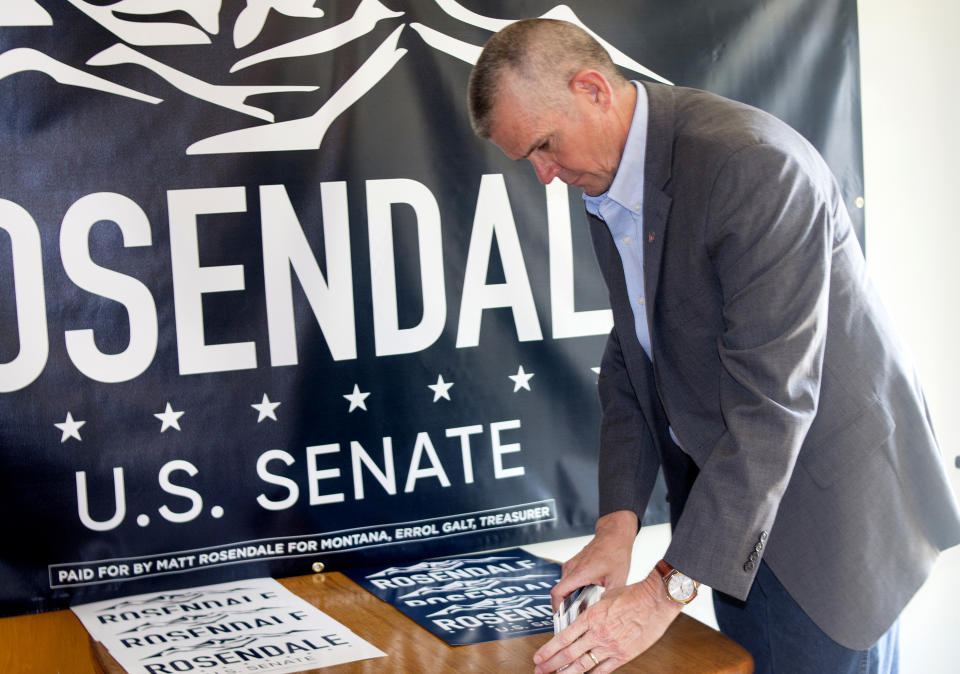
Matt Rosendale, the Montana state auditor who is seeking the nomination to take on Democratic Sen. Jon Tester, is a somewhat unlikely candidate for Bannon’s blessing, because he has publicly aligned himself with Senate Majority Leader Mitch McConnell for months.
Nonetheless, Bannon’s circle made him a top priority — especially after Moore’s loss in Alabama, when a weakened Bannon seemed less inclined to pursue his war against McConnell.
Rosendale did pose for a picture with Bannon in October, at the height of Bannon’s popularity. Moore had just defeated the establishment candidate, Luther Strange, who also had Trump’s support, and Bannon was cultivating an image as a kingmaker. And Rosendale has an issue profile and a personal style that appeals to the same populist base as Bannon and his allies. He’s taken hard-right positions on health care, gay marriage, and land use, a big issue in the West. He can match his 1950s-era buzz cut against Tester’s.
But Rosendale has been reported as the Republican establishment’s preferred candidate. His campaign said in August that McConnell’s position as majority leader was “not in question.”
By contrast, Rosendale’s chief rival, former state judge Russell Fagg, has pointedly declined to endorse McConnell as leader, although in a statement to Yahoo News, Fagg spokesman Sam Loveridge said he “looks forward to joining Senate Republicans and Leader McConnell as a member of the GOP’s majority in 2019.” Loveridge avoided an outright endorsement of McConnell by saying that “right now [Fagg] is focused on his campaign against Jon Tester.”
Rosendale has the backing of the establishment-oriented National Republican Senatorial Committee, mainly because the national party’s top two choices didn’t run. Former Congressman Ryan Zinke took a job as Trump’s secretary of the Interior, and state Attorney General Tim Fox turned down a run.
Rosendale, 57, is not a native Montanan, having moved from Maryland to the state a little more than a decade ago. But his background in land use as a real estate developer,and his personal presentation as a dressed down, gun-toting hunter are in line with conservative sensibilities in a state like Montana.
_____
Patrick Morrissey
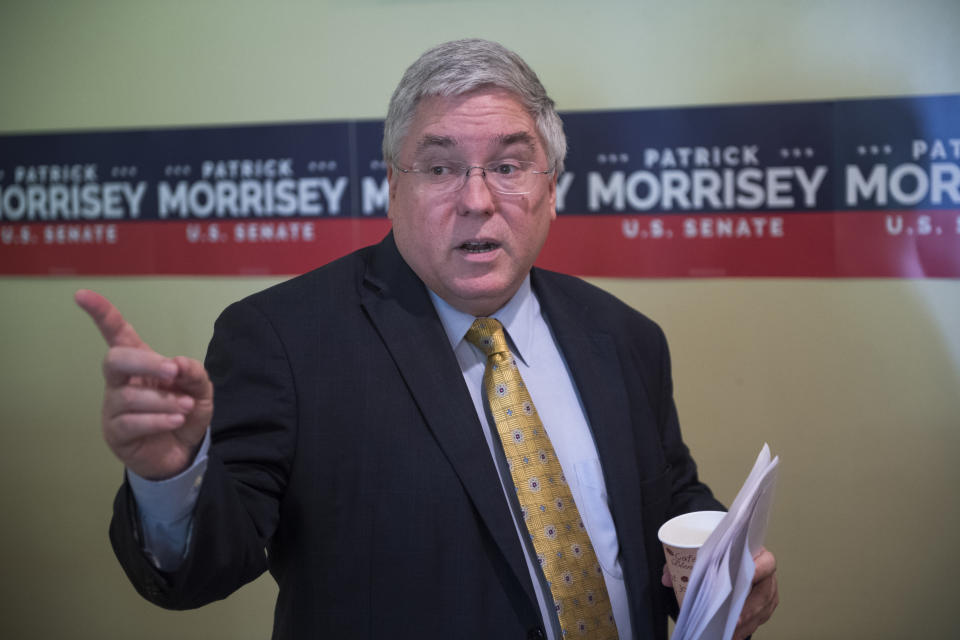
“I’ll stand with President Trump and we’ll beat the Washington elites,” Patrick Morrisey promised in his first campaign ad for the U.S. Senate seat in West Virginia now held by conservative Democrat Joe Manchin.
But Morrisey, the state attorney general, is himself a product of elite institutions in and around Washington. He has deep roots on Capitol Hill, having been a high-ranking congressional staffer from 1999 to 2004, and he helped shepherd the law establishing the prescription drug benefit program.
Morrisey, 50, has also spent years at topflight Washington law firms as an expert on Medicare, Medicaid and FDA regulatory issues. And he lived most of his life in New Jersey, where he ran for Congress in 2000.
Morrisey didn’t move to West Virginia until 2006, and he lives in Harper’s Ferry, right on the border with Maryland. His wife, Denise Henry Morrisey, is a founding partner of one of the top lobbying firms in Washington, and has a residence in northern Virginia.
Even more so than Rosendale, Morrisey is not a typical Bannon candidate. But he and Rosendale are two of the most competitive candidates seeking to flip a Democratic seat this year. And Bannon, who thought Moore was a slam-dunk to win in Alabama — a seemingly safe bet before he was accused of pursuing teenage girls while in his 30s – has always had a pragmatic streak that leads him to side with likely winners.
That doesn’t mean Morrisey lacks conservative credentials. He built a robust track record of fighting against federal regulation as West Virginia’s attorney general over the past five years.
Morrisey sued the Obama administration over the Affordable Care Act, and was part of 13 different lawsuits against the Obama administration’s Environmental Protection Agency, many of them having to do with regulations affecting the coal industry, which employs about 12,000 people in the state.
Morrissey also joined a group of state attorneys general last July in calling on Trump to rescind the Deferred Action for Childhood Arrivals (DACA) policy, which the president did revoke in September.
Morrisey’s chief competitor in the Republican primary is Rep. Evan Jenkins, 57, who spent 20 years as a state legislator in West Virginia — as a Democrat — before getting elected to Congress in 2014 as a Republican.
Jenkins called on Morrisey to “disavow” Bannon after Trump broke with him over the Wolff book.
_____
Kevin Nicholson
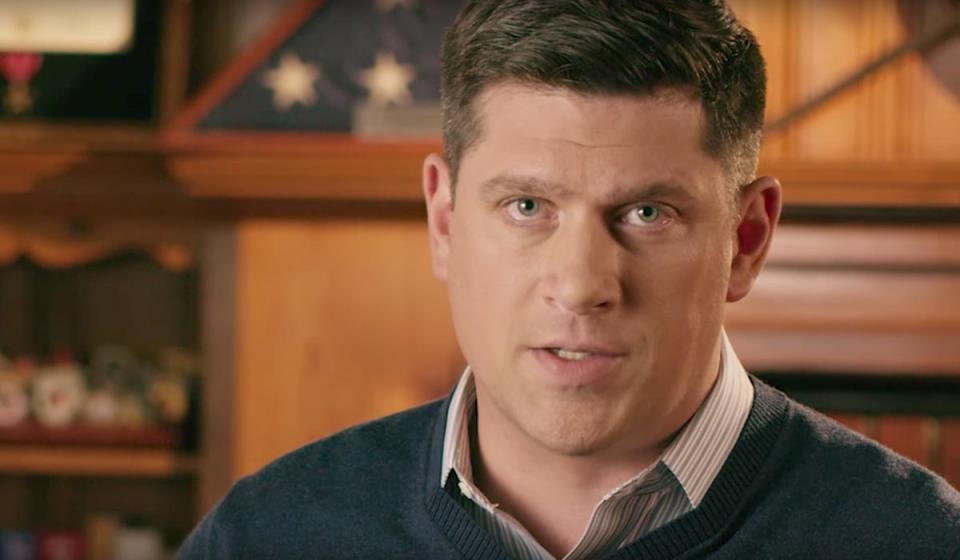
Unlike Rosendale and Morrissey, Kevin Nicholson, a candidate for the Wisconsin Senate seat now held by Democrat Tammy Baldwin, has no experience in government. His candidacy is based on his biography, with a focus on his decorated service in the U.S. Marine Corps.
Nicholson, 39, is so new to politics and public life that there is no entry for him on Wikipedia. But the photogenic and well-spoken Nicholson has received significant financial support from conservative megadonor Richard Uihlein.
Uihlein, who lives in Illinois, has given $3.5 million to a super-PAC formed to back Nicholson’s candidacy directly, Solutions for Wisconsin. And Uihlein has given more than $16 million over the past three years to eight other political groups that have all endorsed Nicholson as well, according to information compiled by the Wisconsin Democratic Party.
Nicholson’s relative obscurity might work to his advantage, because his biography is not as straightforward as it sounds. Before his emergence as a Republican candidate, he was a national leader of college Democrats from 1999 to 2000. He appeared on television during that time touting Democratic talking points, and gave a speech at the 2000 Democratic convention, where he endorsed the pro-choice position on abortion.
Nicholson has explained that becoming a father of three children and seeing innocent lives cut short during his two tours in Iraq and Afghanistan — for which he received a Bronze Star — changed his mind about abortion. And his shift from Democrat to Republican is part of his stump speech.
Yet in a primary, his opponents can be counted on to run ads featuring Nicholson’s past positions and speeches.
He’s facing a formidable primary opponent in Leah Vukmir, a state senator from Wisconsin who has been an ally of Gov. Scott Walker through several years of political battles. Vukmir commands respect in the state Republican Party, and has her own public service background, having been a nurse for over two decades.
Nicholson represented an interesting prospect for the anti-establishment groups, and for Bannon and the Breitbart crew in particular, since he could be a vehicle to subtly undermine House Speaker Paul Ryan in his own state. Nicholson has already criticized Ryan in a private conversation that went public.
With Bannon marginalized, Vukmir has gone on the offensive as Jenkins did in West Virginia, saying Nicholson should disavow Bannon. A Nicholson spokesman downplayed his affiliation with Bannon, saying that he has “a broad and diverse coalition of supporters and endorsers and he is focused on talking about the issues that matter most to Wisconsin voters.”
In this respect, the pressure is now on the anti-establishment crowd to distance themselves from Bannon. It’s quite a reversal from just a few months ago, when Breitbart felt emboldened to openly browbeat Vukmir for “not standing up to the swamp in Washington.”
_____
Chris McDaniel
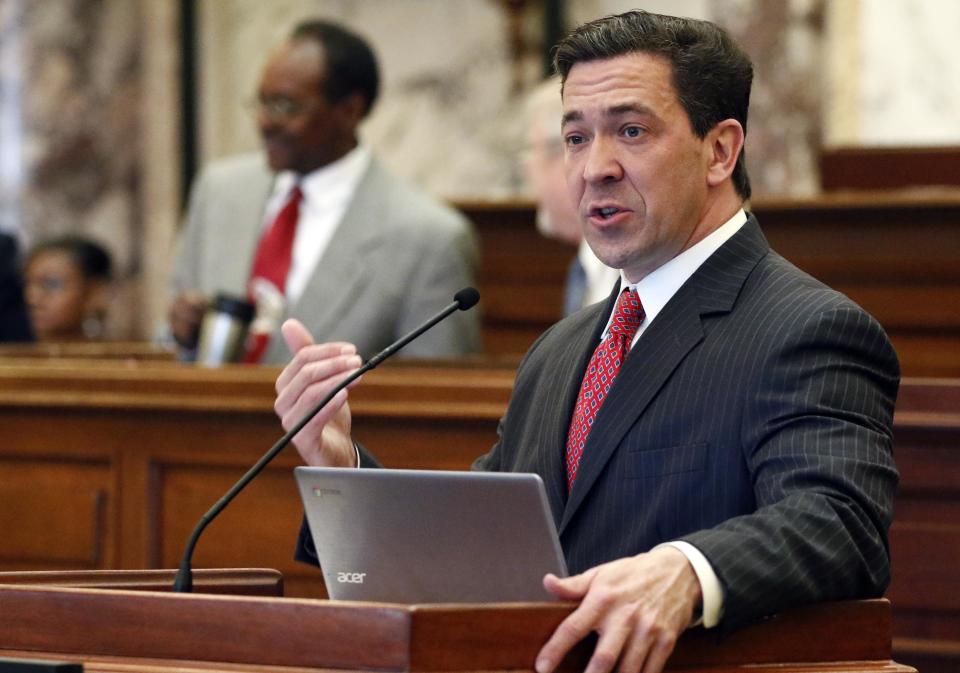
Chris McDaniel spoke as if he were an acolyte of Bannon’s in the past. “I consider Steve to be a friend of mine, and I do follow his advice,” he said in September.
The 45-year-old Mississippi state senator and lawyer came within a few thousand votes of knocking out incumbent Sen. Thad Cochran in 2014, and is still bitter about the way Cochran allies turned out Democrats in a primary runoff to deny him the nomination.
McDaniel appeared poised to challenge Mississippi’s other incumbent, Sen. Roger Wicker, this year. But Bannon’s demise has greatly complicated those plans, leaving McDaniel in a state of limbo.
McDaniel has carried an anti-establishment message for years, and so he was a perfect fit for Bannon and the Breitbart crowd. But when Bannon lost the backing of the Mercers at some point this fall, more mainstream candidates like Morrisey and Rosendale became something of a life raft for Bannon. In private conversations with reporters, Bannon began edging away from candidates like McDaniel, who has a history of troubling comments on race and gender.
The Mercers have given McDaniel $500,000 already. With Bannon marginalized, it’s unclear whether they’ll continue to give to McDaniel. Even if they do, Wicker is a far stronger candidate than the now-80-year-old Cochran was in 2014.
Wicker, 66, spent much of 2017 raising money and building a political organization to run for reelection, and also made sure there was little daylight between himself and Trump, who remains popular in the South. The primary vote for his seat is in June.
However, Cochran is expected to retire soon, amid reports of visible “physical and mental decline.” If he had done so before the end of 2017, that would have triggered a special election within 100 days. That would have been a perfect opportunity for McDaniel, who has a small but enthusiastic base he could mobilize in an off-cycle race.
But now that any Cochran retirement will come in 2018, the special election to fill his seat through 2018 would take place on Nov. 6, the same day as the general election. With both Senate seats up at the same time, McDaniel would lose the advantage he would have in a low-turnout special election. He is talking about possibly running for lieutenant governor instead. But then McDaniel’s challenge would be to raise money from inside Mississippi, where he is largely scorned.
_____
Erik Prince
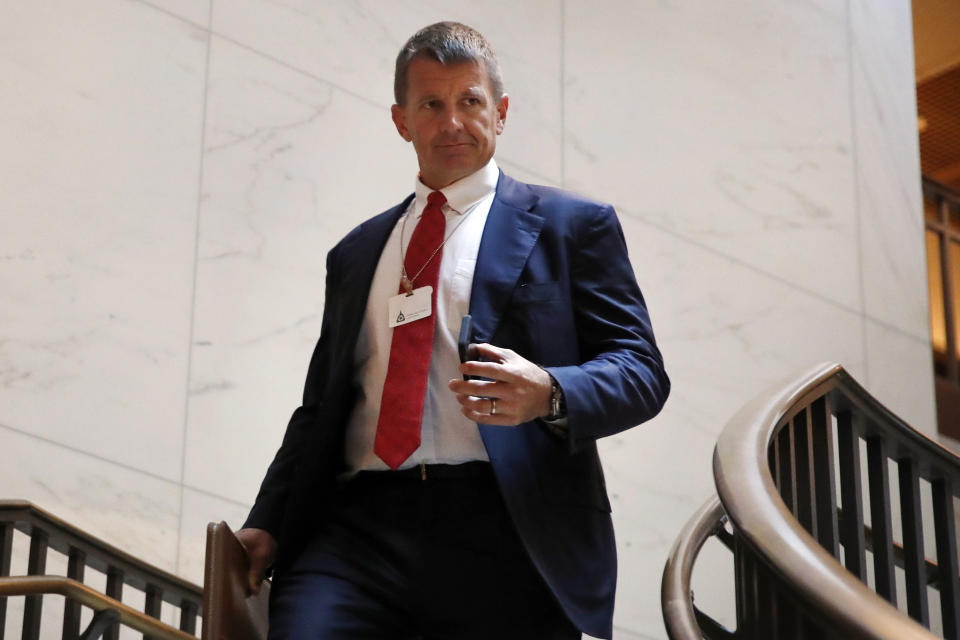
In October, the New York Times reported that Erik Prince, the 48-year-old founder of controversial security contractor Blackwater, was “seriously considering” a challenge to Wyoming Sen. John Barrasso, a senior member of the Republican leadership.
In the wake of Bannon’s banishment, it’s unclear whether he still is.
A Prince campaign would have been the perfect Bannon creation: a renegade right-wing campaign by a high-profile, well-funded outsider, against a senator whose “sin,” to quote the Times, “is not a lack of conservative credentials, but an association with Mr. McConnell and other party leaders.”
Prince even has strong Trump ties: He served as an informal adviser during the transition, and he is the brother of Education Secretary Betsy DeVos.
But now that Bannon is at odds with Trump — and his Mercer money has dried up — an insurgent Prince run seems improbable.
Also complicating matters: Prince, a recruit with thin ties to Wyoming and plenty of baggage already, was most recently in the news for proposing a private spy network to the administration and secretly meeting in the Seychelles with a Kremlin-linked banker as part of an apparent attempt to set up backchannel communications between then President-elect Trump and Moscow.
Many of Bannon’s candidates were already running before he entered the fray — and all of them will continue running and (in some cases) continue causing problems for McConnell and the GOP establishment now that Bannon is kaput.
But Prince may wind up being emblematic of a different kind of Bannon candidate: the kind whose run was dependent on Bannon’s backing, and who now won’t run without him.
_____
Read more from Yahoo News:
Cory Booker says Jeff Sessions’s ‘obsession with marijuana’ puts him ‘on the wrong side of history’
10 things from the explosive new book drawing fire and fury from Trump
After Hurricane Maria, a look back at the Vazquez family, lit by generator
Photos: These incredible macro photos were captured by a phone camera

